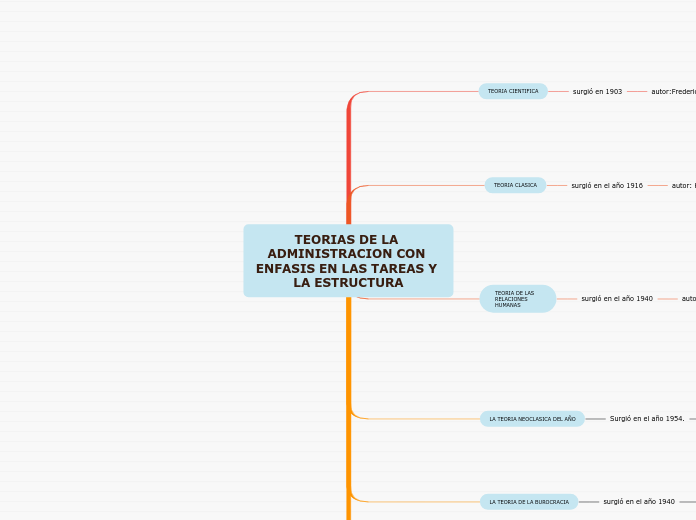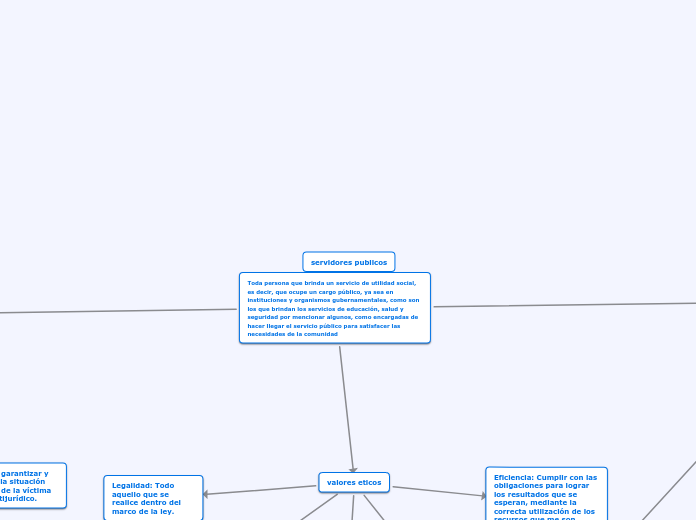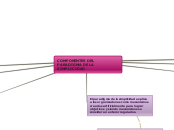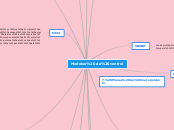fuente: Negrete, N (2019) Teorías de la Administración con énfasis en las tareas y la estructura. Recuperado de https://repository.unad.edu.co/handle/10596/31750
elaborado por: Carmen Cecilia Niño Estupiñan ECACEN BOAVITA
TEORIAS DE LA ADMINISTRACION CON ENFASIS EN LAS TAREAS Y LA ESTRUCTURA
To name your story, you have to think about the overall message and what you want your audience to understand from the story. Also, make it relevant and easy to remember.
LA TEORIA ESTRUCTURALISTA
Surgió a partir de los años 1950.
Principales autores: James Burnham y Max Weber
su énfasis en la estructura, enfoque basado en visualizar las organizaciones como unidades grandes y complejas donde interactúan muchas personas que comparten algunos de los objetivos de la organización. Se introduce el concepto de hombre organizacional y se incluyen los términos de organización formal e informal.
Principios:Se analizan los grupos formales e informales de la organización. Las posiciones más bajas y altas del organigrama. Recompensas sociales y materiales y sus motivaciones en los empleados. La interacción entre la empresa y el ambiente. Se estudian los diferentes tipos de empresas y se clasifican.
LA TEORIA DE LA BUROCRACIA
énfasis en la estructura
principios:Racionalidad. Precisión en la definición de cargos. Rapidez en las decisiones. Uniformidad de rutinas y procedimientos. Reglamentación y normas específicas. Reducción de conflictos entre las personas. Subordinación. Confiabilidad por las reglas y normasconocidas por todos en la empresa.
LA TEORIA NEOCLASICA DEL AÑO
Surgió en el año 1954.
Principales autores: Peter F. Drucker, Ernest Dale, Harold Koontz , Cyril O`Donel, entre otros.
Énfasis en la estructura. Define la Admón. como una técnica social básica. Se estudia las ventajas y desventajas de la centralización vs descentralización. Enfatizan en las funciones del administrador.
TEORIA DE LAS RELACIONES HUMANAS
The ending of a story is essential. We all know that if the ending is weak, what happened before loses its importance. So make it unpredictable, but fair. A resolved ending answers all the questions and ties up any loose threads from the plot.
surgió en el año 1940
This is the moment when the main character surpasses the last obstacle and finally faces their greatest challenge.
The climax usually follows one of these patterns:
- realization
- resolution
- choice
Type in your answer.
autor: Max Weber
su énfasis está baso en la estructura, su enfoque está dirigido en maximizar la eficiencia en la organización a través de la estandarización del desempeño de los trabajadores y la racionalidad funcional.
Principios: 1.División de trabajo 2.autoridad y responsabilidad 3.Disciplina 4. Unidad de mando 5.Unidad de dirección 6. Subordinación de interés particular al interés general 7.Remuneración del personal 8.Espíritu de equipo 9.Iniciativa 10.Estabilidad del personal 11. Equidad 12.Orden 13.Cadena escalar 14.Centralización
TEORIA CLASICA
The middle of the story is where you add layers of complications that will lead to the end. Reveal more about the character's journey. Did their personality go through changes? How did they overcome the challenges? And as you build up the story’s central conflict, make it more personal to that character. Also, from the middle act, you have to lead into the final act.
surgió en el año 1916
Each story has a main character and that character usually needs to solve a problem or challenge. The character's challenge is the one that creates tension throughout the story.
autor: Henry Fayol
In most stories, there are 3 challenges. The number 3 is a mystical number symbolizing completeness. Try to come up with interesting challenges with which your character needs to struggle.
See a few examples below:
- turns into a werewolf at night
- is sent back in time
su énfasis está basado en la estructura, enfocada en aumentar la eficiencia de la empresa a través de su organización y la aplicación de principios generales de la Administración.
TEORIA CIENTIFICA
In the beginning of the story (or the exposition), you will need to introduce the setting and characters. You might also want to introduce the main conflict. This part of the story is important because it gives the reader necessary background information and maybe even a first insight into a character’s personality.
surgió en 1903
Characters are essential to a good story. Usually, the protagonist(s) is/are the most affected by the plot. Introduce a character by focusing on their actions, interests, and occupation, as the physical appearance doesn't make a difference in most cases.
autor:Frederick Taylor
Type in the name of your character.
El enfoque principal de esta teoría es Aumentar la eficiencia de la industria a través de la racionalización del trabajo. Predominaba la atención en los movimientos necesarios para la ejecución de una tarea.
Which traits best describe the character's personality? Choose more if necessary:
introvertedloyalkindindependentquick-thinkingadventuresomeidealisticsweet-naturedcalmrisk-takercreativewittystrictfussyweirdclumsyharshaggressivecarelessclingingcowardlycrueldeceitfulimpulsiveOther
El énfasis estaba dado en las tareas.
Choose the type of your chacter:
Protagonist (main character)Antagonist (main character's opponent)Flat (stereotypical character)Round (his/ her personality develops throughout the story)Static (doesn't evolve as a person throughout the story)Dynamic (dramatical change in personality)Confidant (the main character trusts him/ her)Foil (contrasting character who enhances the personality of another character)Other










